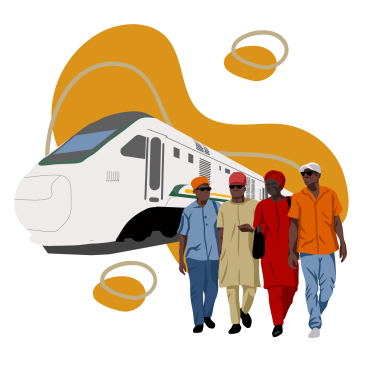
Demand 04
Transportation
The transportation system in Nigeria poses a huge challenge to safety and mobility, with few cities having modern highways and advanced traffic management systems.
There’s a high crime rate on roads and a very inefficient and expensive alternative means of transportation.¹⁴ Nigerian vehicles emitted 1.49 trillion tons of CO2 between 2000 and 2016. Under a business-as-usual (BAU) scenario, with an almost universal reliance on the road network for the transportation of passengers and freight in the country, greenhouse gas emissions from the transport sector could increase by up to 50% by 2035 and almost double by 2050.¹⁵ Railway networks across the country are scanty and mostly nonfunctional, widening the margin of inter-state travel and affordable transport. Considering mobility needs, economic growth, rapid urbanisation and population increase, there’s a great need to invest in transportation infrastructure, make public services affordable and safe, and regulate alternative industries like the aviation sector for its inefficacy.
Call to Action
State governments to develop a comprehensive transportation structure that integrates bus rapid transit, light rails and waterways freight, and other non-motorised transportation like safe walking, cycling and parking infrastructures.
Make transportation systems inclusive, accessible and safe with information, communication, measures and equipment that aid usage for vulnerable groups like persons with disabilities and the elderly.
Promote the use of sustainable transportation options that are accessible to persons with disabilities. This includes investing in accessible public transit systems, promoting the use of low-emission vehicles such as EV and CNG-powered vehicles with accessibility features, and expanding networks of accessible pedestrian and cycling paths (for wheelchair users).
The Federal Ministry of Transportation must work with State governments and other stakeholders to coordinate risk assessment and response plans to aid the development of climate-resilient transportation infrastructure.
Develop and implement active policies on vehicle importation and emission standards, and place a ban on imports of high-emitting vehicles and those that have exceeded their economic lifespan
Revitalise the steel and manufacturing industry and invest in training young Nigerians to build, assemble and repair
vehicles.
Governments at all levels must invest in the transportation sector and create a conducive business environment to
attract investments in the sector, this could take the form of public-private partnerships to finance, build and
operate projects.
Work with city and urban planners to develop and implement urban plans that ensure a modal shift toward public
transit and non-motorized transportation modes while avoiding new construction in flood-prone zones.
Follow through with the Energy Transition Plan for deep decarbonization strategy to decrease transportation
emissions by 97% due to the uptake of Electric vehicles (EV) in the passenger car segment.
Invest in infrastructure and technology that promotes green-powered transportation and renewable energy, and
move away from a fossil-fueled transportation system
References
[14] https://www.legit.ng/1132835-problems-road-transportation-nigeria.html
[15] https://climatechange.gov.ng/wp-content/uploads/2021/08/NCCP_NIGERIA_REVISED_2-JUNE-2021.pdf